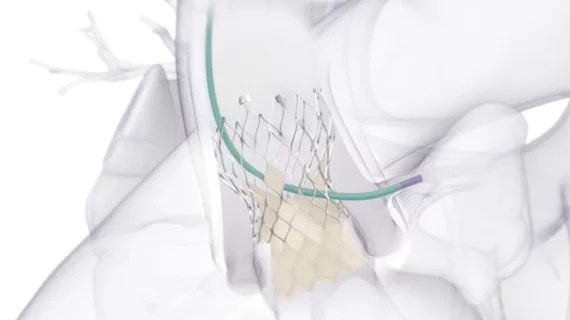Medtronic TAVR valves at heart of key studies presented during PCR London Valves 2024
Medtronic’s supra-annular, self-expanding Evolut transcatheter aortic valve replacement (TAVR) valves were at the center of multiple clinical trials presented at PCR London Valves 2024. One study focused on the cusp overlap technique while the other tracked paravalvular leak (PVL) improvements over time.
“With the Evolut TAVR system, we are committed to improving outcomes for patients while maintaining exceptional safety and efficiency," Nina Goodheart, senior vice president and president of Medtronic’s structural heart & aortic business, said in a statement. “The data presented at London Valves 2024 further establishes Medtronic and Evolut as leaders in the supporting and sharing the robust clinical evidence physicians need to make the best decisions for their patients when choosing and performing TAVR.”
The potential impact of utilizing a standardized TAVR pathway
One study presented during the conference was Optimize PRO, a global analysis of an optimized care pathway that included, among other details, using the cusp overlap technique to deploy TAVR valves. Overall, utilizing the recommended pathway to implant an Evolut PRO or Evolut PRO+ TAVR valve was associated with an all-cause mortality rate of 0.8%, disabling stroke rate of 1.7% and cardiovascular rehospitalization rate of 5.7%. The combined endpoint of all-cause mortality or any stroke was seen in 5.1% of patients. Meanwhile, the permanent pacemaker implantation rate was 6.4%, and there were no cases of moderate or severe aortic regurgitation at discharge.
“We are encouraged by this data, as it demonstrates significant positive outcomes when leveraging the cusp overlap technique with the Evolut valve,” co-principal investigator Steven J. Yakubov, MD, a cardiologist with OhioHealth Riverside Methodist Hospital, explained. “The new results support a standardized protocol that will help support early hospital discharge and lower rates of complications for our patients, improving their quality of life.”
Tracking paravalvular leak after TAVR
Tracking echocardiographic data from more than 600 patients treated with the Evolut Pro TAVR valve, researchers found that PVL severity after 30 days was none/trace for 60.8% of patients, mild for 36% of patients, moderate for 2.9% of patients and severe for just 0.3% of patients. The team also noted that PVL appeared to grow less and less severe as time went on. After three years, PVL severity was none/trace for 79.8% of patients, mild for 19.6% of patients, moderate for 0.6% of patients and severe for none.
“This analysis expands upon previous studies and found a majority of patients classified with mild or greater PVL improved in their PVL severity at three years,” lead investigator Nicolas Van Mieghem, MD, PhD, a cardiologist with Erasmus University Medical Center in Rotterdam, The Netherlands, said in the same statement. “This study will help inform physicians on the treatment of this complication post-TAVR.”

